
Improve Yourself, Improve Your Relationships
Drs. Les and Leslie Parrott explain how you can improve your marriage by becoming emotionally healthy, and examine three key aspects of good emotional health.
Today, an expectant mother faces a life-and-death decision. Will you help save her baby’s life? Double your gift to help save babies from abortion through a $1.1 Million Match Opportunity!
Rescue 2x the babies from abortion!
Home » Episodes » Focus on the Family Broadcast » Helping Your Child Develop Resilience (Part 2 of 2)
Preview:
Dr. Kathy Koch: Most resilient people don’t want to sit down in the valley. They want to figure things out. So they try again, and they try again. So these are children who don’t whine and complain, “Mommy, it’s too hard. I can’t do it.” But instead they go, “Shoot, this was hard. I wonder what would make it easier?” So on their own, they still need a mom and dad to be the support system. Absolutely. But on their own, they begin to figure things out. So they develop a healthy independence, which I think is so great. Healthier mental health.
End of Preview
John Fuller: Well, that’s Dr. Kathy Koch, and she joins us again today on Focus on the Family with Jim Daly. Thank you for joining us. I’m John Fuller.
Jim Daly: John, it sounds funny. I’m laughing already going, “I’m so excited to hear today’s program.” But last time-
John: (laughs).
Jim: … we had a great chat with Dr. Kathy Koch.
John: We did.
Jim: And I just, I think I love the art of parenting. Um, I’m no expert, believe it or not. I get to hear from a lot of experts, but I just love the challenge of it and the thought that it takes to do a good job. I don’t always do a great job. Let me confess that right away. Jean would say, “That’s true,” (laughs). But you know, it’s fun. It is an art.
John: Yeah. Don’t you feel like when they were younger it was easier and the stakes weren’t so high, and now they’re adults and the continual-
Jim: Gee, that’s a good question. I don’t know and-
John: … challenges and opportunities?
Jim: … you know, you’re constantly building into them. So I think it’s been pretty-
John: Hmm.
Jim: … even for me as a child, you want them to catch certain principles-
John: Yeah.
Jim: … and guidance. What we’ve been talking to Dr. Kathy Koch about is building resiliency into your child. I think as I listen to all the experts, that is critical. And that’s even with scripture. I mean, scripture is trying to teach us that as adults.
John: Mm-hmm.
Jim: But how we can help that journey for our future adults by teaching them how to be resilient. I mean, the Lord talks a lot about the valleys-
John: Mm-hmm.
Jim: … and what we need to learn there. So I’m excited about continuing this talk with Dr. Kathy Koch.
John: Yeah. She’s got a great love for the Lord and His Word, and she loves children and helping children thrive. You can hear that as she shares. Uh, she’s a passionate champion of children. Uh, Kathy is the founder and president of Celebrate Kids. And, uh, she’s a podcaster. She speaks to parents and educators and kids themselves. She’s written a number of books and, uh, we’re really excited about this book, uh, that forms the foundation for our conversation today. Resilient Kids: Raising Them to Embrace Life with Confidence. And you can learn more about Kathy and her ministry and, uh, this great book at our website. That’s focusonthefamily.com/broadcast.
Jim: Welcome back, Kathy Koch.
Kathy: Thank you. Glad to be here.
Jim: It’s good to have you (laughs).
Kathy: Glad to be here.
Jim: Resiliency is so interesting. Give us the recap of why parents should be mindful about teaching our children resiliency, and then we’ll get into how we do it (laughs).
Kathy: I’d love to. So, resiliency is readily recovering from difficulty, disappointment, trauma, failure, grief, shame, the difficult parts of life. And life is going to have difficult parts to it. If children don’t learn how to recover and come back, maybe even bounce back, move forward past the failure, they’ll live at home forever. Let’s put that out there.
Jim: Yeah.
Kathy: Um, but most importantly, Jim, if they don’t develop an ability to walk out of their trauma, they won’t become who God intended for them to be. And that grieves me because God has a plan for every person He creates. And it’s only when we’re resilient where we come back from difficulty that we’ll learn and grow and discover how life works. We’ll develop character, faith, um, perseverance and diligence, problem solving, health, mental health, all of that. And, and we know it. ‘Cause you can watch a resilient person and you can watch a fragile person very different.
Jim: Yeah. And we may not understand it that way, but when you have that, um, uh, grid to look through-
Kathy: Mm-hmm.
Jim: … it does become more apparent. You know, the Lord talks about it as shalom his peace and the world’s chaos.
Kathy: Yes.
Jim: And even the church, even Christians can live in the world’s chaos-
Kathy: Oh.
Jim: … if we’re not embracing God’s shalom, His peace. And I think his peace in some ways is defined as learning these tools of resiliency. And, you know, this is what it’s about.
Kathy: I think that’s brilliant. And do we trust God? Do we believe in His strengths or don’t we?
Jim: Yeah.
Kathy: Do we believe that He has a purpose for us? Do we believe that His wisdom is worth following and that he is a God of second and third chances? Do we believe that forgiveness works, et cetera? Do we model that? Do we believe that? Do we teach that? Do we celebrate that? Do we worship Him so that our kids realize that us following him changes us, therefore they might want to too? We could spend a whole episode on that.
Jim: Yeah. I mean, Proverbs 3:5, right?
Kathy: Yes.
Jim: “Uh, do not lean on your own understanding-”
Kathy: Yes.
Jim: “… but in all your ways, acknowledge Him and he will make your path straight.”
Kathy: Come on.
Jim: I think that’s-
Kathy: It’s good.
Jim: … great what you’re talking about.
Kathy: It’s good.
Jim: Um, in that regard, uh, you’ve been with us before, obviously to talk about the five core needs. We did that, um, in a different episode. Um, we’re gonna post a, a link to that program on the website-
Kathy: Mm-hmm.
Jim: … so people can go hear that great content.
Kathy: Cool.
Jim: Uh, but walk us through those needs and what they mean for our children.
Kathy: I would love to because they’re super related to resiliency. So the first of the core needs that we believe all of us adults as well, are created to have met, is a need for security. Who can I trust? And we’re talking to you about resiliency. How do kids overcome trauma and difficulty defeat and embarrassment? They have to trust you. If they don’t trust you to come to you and say, “Dad, this happened. I don’t know what to do.” Or, “Mom, I don’t know what to do.” If they don’t trust you, they won’t come to you and you won’t be able to be their hero who will rescue them in a difficult moment. So are you honest? Are you available? Are you telling the truth? Are you teaching or telling? Are you yelling and shaming? “Why did you let that happen?” Or are you saying, “Talk to me, son, let me help you.” So are you available? Are you trustworthy? It’s huge.
Jim: Yeah.
Kathy: And if you’re not, Jim, and I don’t say this to put shame on anybody, obviously we all need to ask again to be forgiven because we all make mistakes. But I will tell you that kids are desperate for security. We have an identity crisis in our country because we have a security crisis. There’s a security crisis. If they cannot trust you to be there and to tell the truth and to build them up and to be on their side, they will go find someone else.
Jim: Yeah. That’s why groups become important, friend groups.
Kathy: Absolutely.
Jim: And sometimes they’re not really helping in-
John: Mm-hmm.
Jim: … the most positive of ways.
John: Yeah.
Jim: Kathy, let me ask you, in terms of belonging and identity, in addition to security, which you just covered.
Kathy: Right.
Jim: What, those other two elements, how does that play into our child’s development of resiliency?
Kathy: Yeah, super important. So security, who can I trust? Leads to identity. Who am I? So do your kids know their strengths? Have you told them that they’re overcomers? Have you told them that they’re learning to handle defeat easier than in the past?
Jim: So we would say speaking life into them.
Kathy: Yes. Yes. Giving them truth that-
Jim: Right.
Kathy: … upholds them and builds ’em up. And then that influences belonging. So if they’re paying attention to negative people, maybe it’s because they’re negative themselves. So have you taught them who they are, that they are blessed to be a blessing, that they’re capable, that they’re overcomers, that they’re learners, that they’re improving? So these are their identities. And now they walk into relationships and they walk in not defeated and not shamed. They walk in being overcomers, and now they look for people who are positive influences on their lives as well.
Jim: So that’s the outcome of those postures for the parent.
Kathy: Yes.
Jim: When you’re speaking these truths to your children, it is building them up.
Kathy: Yeah.
Jim: Hopefully not… Can you overdo that to build them into a false sense of who they are?
Kathy: So you have to tell the truth.
Jim: Yeah.
Kathy: And they must know their strengths so they can overcome their challenges. It’s not prideful to know your strengths. It’s prideful to not know your weaknesses. It’s prideful to think your strengths are more important than somebody else’s. But if kids don’t know their strengths, that they’re creative and other centered and outgoing and careful and wise and quick mathematicians, if they don’t know their strengths, they won’t know who they can be. And they won’t know that they can overcome trauma. So they do have to know that. Now, if you see them being prideful, I’m the best of the best, then no. Let’s have a lesson in humility, (laughs).
Jim: Yeah.
Kathy: Yeah.
Jim: Well, let me ask this question. I was at a conference, and this isn’t in your book. Um, so this is an outside question.
Kathy: Okay.
Jim: But there was a specialist, a psychologist in trauma.
Kathy: Hmm.
Jim: So this is school shootings, hurricane victims. And he said they had done research of over 500 victims of these situations-
Kathy: Mm-hmm.
Jim: … traumatic events. And he said the number one, uh, important tool for a human being to get through those events, and I was expecting resiliency, he said it was humility.
Kathy: Oh, interesting.
Jim: And I went, wow. Because it, you know, that struck me in-
Kathy: Yeah.
Jim: … such an amazing way because the Lord says, “Be humble-”
Kathy: “Be humble.”
Jim: “… for I am humble.”
Kathy: Absolutely.
Jim: So it may be bigger than poetry.
Kathy: Wow.
Jim: And the Lord is saying, be humble, because it will help you get through life and get through life’s most dramatic moments.
Kathy: It allows you to ask for help.
Jim: Well, and they said also it allows you to empathize-
Kathy: Yeah.
Jim: … that you’re not perhaps in the worst possible position, others may be worse off than you.
Kathy: Yeah.
Jim: It’s fascinating. Which gives you hope.
Kathy: Absolutely.
Jim: So, I, I just found that really, when you look at resiliency and then you look at humility, there is a combination, right?
Kathy: Absolutely. Yeah. Because if I’m not humble, if I’m prideful, I will never expect to be wrong.
Jim: Right.
Kathy: And so now when I’m wrong, I crumble. Versus somebody who’s humble and teachable and aware that, “I don’t know a lot yet ’cause I’m still young and I’m learning,” they handle that better because they know that that’s how life happens.
Jim: Yeah. I think for us as Christians, one thing, uh, Jean and I tried to do is always to talk about we’re sinners saved by grace.
Kathy: Hmm.
Jim: That no one’s perfect, that we’re gonna fail. Uh, we’re gonna make mistakes like we talked about last time. And that the Lord knows that, and his heart does not shrink. His love for us doesn’t shrink because of that. Like a good parent, he’s gonna be an encouragement to us to say, “Okay, pick yourself up. Let’s keep moving. I covered, you know, the price that needed to be paid for that.”
Kathy: Absolutely.
Jim: (laughs).
Kathy: And I mean, let’s look at heroes in the Bible. Right?
Jim: Right (laughs).
Kathy: We could, we could talk forever about-
Jim: They’re all kind of messed up.
Kathy: I mean, David-
Jim: (laughs).
Kathy: … who made horrendous decisions-
Jim: Yeah.
Kathy: … and, and mistakes, if you will, and yet was a man with a heart for God. And I mean, Jesus is the hero of, of resiliency. He didn’t stay down and He walked all the way to the cross for us, um, finishing the task. So the Bible alone is full of amazing examples of who God would want us to be and how He would want us to behave.
Jim: Yeah. You know, so often, Kathy, uh, again, it feels like it’s gonna be more complicated. Teach your child resiliency. That’s a big word.
Kathy: Right.
Jim: What does that mean?
Kathy: (laughs).
Jim: Uh, but you’ve had, you know, the book has great examples in there about how to go about talking about it-
Kathy: Mm-hmm.
Jim: … you know, just the idea of talking to your kids about resiliency. I think you had a friend named Sally that you were on the phone with and-
Kathy: Yeah.
Jim: … just the way she prioritized, communicated something to her children. What happened?
Kathy: This really impresses me. So when Sally’s three boys were of school age, if she was on the phone when they walked in the door from school, she immediately hung up and her friends knew that this was her policy. So she would say, “Hey, you know, Caleb’s home, talk to you later.” Hang up. And the first 30 minutes that those boys were home, were there 30 minutes.
Jim: Now what did that communicate to those boys?
Kathy: That they were important?
Jim: Yes.
Kathy: And that she was available. And if you don’t think you’re important, then you don’t think anything you think is important. So why would you share anything about your school day with your mom? And your mom is distracted and she’s cooking and she’s on the phone, and somebody else is always more important. And when children believe that somebody else is always more important, it will crush their soul. And they may not have the words that they would even use to express that. And again, no shame, no blame for people listening who don’t know this. This is why we’re on the radio today.
Jim: Absolutely.
Kathy: You know, we’re trying to give you hope that you can do something differently, but being available to the conversation, being available to the child’s heart cry, “Mommy, it was so bad in school today.” Or, or the dad picks the kid up at school, you know, and drives him home and says, “Dad, I don’t know how to handle it.” You know, to be available.
Jim: And encouraging those conversations-
Kathy: Yeah.
Jim: … in a variety of ways, I think is really important. Because if you have boys, which I don’t have the experience having girls-
John: Mm-hmm.
Jim: … you do John.
John: Mm-hmm. Yeah.
Jim: But, you know, you pick boys up, “How’s your day? ‘Good.’”
Kathy: Fine. (laughs).
Jim: “What’d you eat? ‘Not much.’”
Kathy: Right.
Jim: “What was your favorite thing? ‘Nothing.’”
Kathy: Right. (laughs), we can ask different questions.
Jim: They’re not, they’re typically not very verbose-
Kathy: No.
Jim: … right? But, so you have to dig a little and, and create a talent for digging.
Kathy: And yes. And what you said before is really important. Was it at the end of the last episode where you said you like the art of parenting-
Jim: Yeah.
Kathy: … and you’re not perfect at it.
Jim: Yeah.
Kathy: You don’t have to have all the answers to have a conversation with your kid. Don’t be afraid to have a conversation for fear that they’re gonna have something that happened to them that you have no personal experience with and so now you don’t know. Then you simply say, “Oh my goodness, I’ve never thought of that before. Let’s keep talking about what you could have done differently or what you could do differently tomorrow.” So having your own sense of confidence without perfection, I think is key there.
Jim: Right.
John: This is Focus on the Family with Jim Daly, and I’m John Fuller. And our guest today is Dr. Kathy Koch. So much good stuff here. And, uh, you can get, uh, the whole book of great ideas about building resiliency in your child. It’s called Resilient Kids: Raising Them to Embrace Life with Confidence. We’ve got it here at the ministry. You’ll find all the details about the book and our guest at focusonthefamily.com/broadcast.
Jim: Kathy, before we move to another subject, um, for that parent that has a situation where their child’s just in this prolonged rut-
John: Mm-hmm.
Jim: … they, they’re not finding a way out of it. Um, what encouragement would you have for that parent to stick with it? You’re being positive, you’re hopefully praying with them and helping them as you can spiritually, emotionally, in every way. But in the back of your mind as a parent, you’re going, “Oh my goodness, this thing is taking way too long to get out of.”
John: Hmm.
Kathy: Mm-hmm.
Jim: Now, there could be some other issues of depression, anxiety, but what do you do to assess that as a parent? That’s a big question.
Kathy: That is a big question. And my first answer might be to consider that it is something major of, of a clinical diagnosis might be necessary for anxiety or depression. Are there some outlying, um, issues related to stress that you might be unaware of? There is nothing wrong with seeking help. And the other thing that I want to say is, is it possible that the rut your child is in is a rut he doesn’t need to get out of? And what I mean by that is-
Jim: Hmm.
Kathy: … you don’t want him to stay down in a negative, horrific mental health space. But what if you’re asking me to do something that isn’t his to do? What if you’re-
Jim: Give, gimme an example to help me understand it. Yeah.
Kathy: … what if you’re a musician and you want your kid to play the piano, and he is not driven to play the piano, his teacher has even told you, “He is not a piano player.” This is where the mom and the dad have to say, “Okay, I love music, but I’m gonna raise the kid God gave me. And he gave me a kid who’s not inclined toward music and I’m gonna let him quit.” Now I believe in fulfilling commitments. So if you say you’re gonna play a year of soccer or a season of soccer, you know-
Jim: I was thinking sports dads.
Kathy: Yeah.
Jim: (laughs).
Kathy: So you, you, you made a commitment to a coach and a team, and you’re gonna play soccer for a season ’cause you made this choice. But at the end of that season, if your kid is just whining and complaining and desperate to not go back, this is where you and your humility as a mom and dad sit back and go, “Okay, what’s going on here?” Now, if there was a negative coach, if it was a, a bad situation, maybe he was the youngest on a team and that’s why he was defeated a lot. And maybe you wanna try another season. This is where you ask the Lord to give you guidance here. But there’s nothing wrong with us stepping back and going, “Okay, you don’t have to be an expert at everything and you don’t have to like everything.”
Jim: Mm-hmm.
Kathy: I want kids exposed to a lot. This is how we find out where their gifts are.
Jim: Yeah.
Kathy: But they don’t have to necessarily fulfill everything that we think they should. This is where it’s hard to be a parent.
Jim: (laughs).
Kathy: And sometimes we have to seek, you know, wisdom again from teachers and coaches and our siblings and even our parents.
Jim: Well, I, you know, this was the area I started off poorly in-
Kathy: Mm-hmm.
Jim: … and then I quickly made the adjustment ’cause I played football, basketball, and baseball.
Kathy: Wow.
Jim: So I have two boys, “I think, of course they’re gonna play.”
Kathy: Of course.
Jim: And of course Trent, he’s like 6’6″, 6’7″, thinking I have a specimen of a football player here.
Kathy: (laughs).
Jim: And I remember one of the first phone calls that he called me when I was on the road, he was in sixth grade. And he goes, “Dad, I won a gold medal.” And I was like, “Oh, that’s awesome, Trent. What was that in?” He said, “Chess.”
Kathy: Oh.
Jim: I went, “Chess, that’s great.”
Kathy: (laughs).
Jim: “That’s so amazing. I’m so glad.” (laughs). I mean, I, but I, I really had to do it. And then I just, from that point, I made the decision his sports life will be his.
Kathy: Wow.
Jim: I’ll encourage him, but I’m not gonna be positive or negative about any of it. You know, I’m just gonna say “That’s good.” Um-
Kathy: How did you do that?
Jim: You know, I just watched, the best teacher I had were outta control dads at sporting events that were-
Kathy: Oh.
Jim: … so obnoxious to their kids. You know, baseball games where the-
Kathy: Right. Right.
Jim: … dads yelling at the kid at the plate. That… I remember my alcoholic father coming to a little league game of mine. And it’s so shame me, you know, he, “Hey umpire. That wasn’t, that wasn’t a strike.” And he was doing it in that intoxicated sound.
Kathy: Mm-hmm.
Jim: And I remember just standing at the plate that made an indelible imprint-
Kathy: Uh-huh.
Jim: … on my mind. So like I hear a dad yelling at his kid, I just wanna-
Kathy: Right.
Jim: … kinda take him by the scruff of the neck and take ’em behind the bleachers and say, “What are you doing?”
Kathy: So, praise God for the Holy Spirit. Right? (laughs).
Jim: Yeah. Yeah. But I mean, in that context though, but you really, again, I think, and moms would have this issue too.
Kathy: Oh, definitely.
Jim: I mean, whatever the topic is or the vocational thing they’re looking at, you gotta back down.
Kathy: Well, you have to know who you’re raising.
Jim: Right.
Kathy: It’s not about your children making you look good. This, we have to separate this out. Yes. You parent so your kids become who they can be, but they’re separate from you. And I also say to moms and dads, “You’re also more than a mom and a dad.”
Jim: Right.
Kathy: You’re, I pray that you commit to marriage and then your sisters and daughters and aunts and best friends and volunteers and all of these other things. So don’t get so wrapped up in your kid that all of your everything-
Jim: Yeah.
Kathy: … is put upon the child, the stress that they feel is going to potentially cause them to collapse.
Jim: Yeah.
Kathy: So again, we can change, we can lift out of this if this is the belief that somebody is listening with.
Jim: You know, one thing that’s important, and you mentioned it in the book, the self-talk, that inner monologue that takes place. And I, I don’t know if this is true of everybody, Trent and I were talking about this ’cause he’s doing brain research in college now, so this is kind of fun. But he was saying the other night, not everybody really has that inner discussion.
Kathy: Mm-hmm.
Jim: A majority of people do.
Kathy: Mm-hmm.
Jim: But I thought that was kind of interesting that some people may not even have that. Uh, but speak to the importance… now we talk about it as positive thoughts or self-talk. To add that biblical principle there, because some people, as Christians, we get a little, uh, you know, apprehensive about psychology. And I get that.
Kathy: (laughs).
Jim: But I think psychology proves scripture.
Kathy: Hmm.
Jim: Uh, I don’t have a problem with it, and that’s always been my position. But, but in that regard, speak to the healthiness, emotionally, spiritually, of talking yourself through something and teaching your kids to do the same.
Kathy: That’s… I’m glad you brought that up. Um, as I said earlier, I think ye- in yesterday’s program, beliefs cause behavior. And our beliefs show up in our vocabulary. And that starts in our head. Most of us don’t say anything out loud that we haven’t rehearsed in our mind.
Jim: Mm-hmm.
Kathy: We’ve thought, and we’ve wondered, “Okay, if I say that, what will they think of me? And how will they react?” So when your children say, “I’m so stupid,” they have had those thoughts inside their head. And if they’re not saying it, but they’re acting like they think it, then you know that the self-talk is-
Jim: Yeah.
Kathy: … defeating them. So I think we’re, we’re bold and we look at our kids and we say, “I’m gonna predict based on the fact that you just gave up quickly, that you’ve been thinking you’re stupid.”
Jim: Hmm.
Kathy: “But you know what? You’re not stupid. This is new. We haven’t done double-digit edition before. The reason you go to school, it’s to learn what you don’t yet know. And so I don’t want you to be defeated. This is tricky. Or spelling rules don’t always work. Or you know, the best baseball players get to first base three outta 10 times. So why are you complaining all the time?” We’ve gotta teach kids a better view of victory, if I can put it that way.
Jim: Perspective.
Kathy: A perspective. So it starts with us predicting what they might be thinking, listening to what they’re saying, ’cause it starts in their head and then challenging them. And I would say, depending upon the situation, again, it depends. You have to have a good relationship with your kids to say, “What makes you think you’re stupid?”
Jim: You know, when you said that, Kathy, I mean, in my stomach, in my gut, I had a reaction there about a child saying, “I’m so stupid.”
Kathy: Yeah.
Jim: That just, ah, it, it creates tears in my eyes. Oh, it’s so bad. Jean and the boys were in Washington DC, I had meetings and they went on a kind of a DC tour of probably the Lincoln Memorial and Washington Memorial. But there was a young man, a, you know, a boy about the age of Trent and Troy on that trip with his parent. And at one point the, the host was asking questions and he answered incorrectly. And he kept, the boys told me, he kept hitting himself in the head, “I’m stupid, I’m stupid-”
Kathy: Oh, no.
Jim: … right in front of everybody. And I just, man, I went, “What do you think was going through that little boy’s head?” You know, and let them kind of express it. But I thought it was a good moment for them to learn, “He was being way too hard on himself.”
Kathy: Right, right.
Jim: Yeah.
Kathy: So, no, and and to the parent who hear like, I love your heart for appearance, Jim. So the parents who hears the boy or the girl mumble, “I’m so stupid.” No, it better break your heart.
Jim: It should.
Kathy: You don’t want… Right. You don’t want your kids to think that. No. You have to know they’re not stupid. They weren’t thoughtful, they weren’t careful. They didn’t plan. They forgot to study. They didn’t ask for help. They rushed-
Jim: They didn’t know the answer (laughs).
Kathy: They didn’t know the answer. No. And so you have to teach your children what is reality and you don’t allow the word stupid. “I was unprepared, I was careless. I rushed, I was prideful.” Teach them to tell the truth in their head and their self-talk, and then outside of their head if they will.
Jim: Yeah.
Kathy: And honor them when they’re truthful and give ’em a hug and say, “I’m so proud of you for recognizing that you need to study more because this is challenging. Grateful that you’ve discovered you’re not stupid. This is new.”
Jim: Yeah. That’s so good. The spiritual application of that. Let’s hit that. Um, h- how do we increase the child’s capacity for spiritual understanding when it comes to their abilities, et cetera?
Kathy: Yeah. I love that question. We have to teach kids that, you know, God is on the throne and He cares and He’s on our side and we can pray and He will teach us much, but we cannot treat Him like Amazon Prime.
Jim: (laughs). That’s good.
Kathy: We’re not gonna get everything we want when we want it the way we want it right now. So do we know that he partners with us and we’re still responsible for things, right? And I think, again, do we pray and do we pray with integrity and in relationship, understanding his authority? Do we know the whole of God? If children don’t know a whole lot about the bigness and magnificence of God, it’s easier to give up.
Jim: Mm-hmm.
Kathy: If all they know is that God is wise and they don’t get an answer to a question, now they think, “Well, God isn’t wise and now he’s nobody.” And now they drop out of faith in the church. So do they know the whole of God? Do they understand that worship has a place and, and prayer has a place and, and the word has a place and all of that.
Jim: It’s so good. And you know, even to teach a child the bigness of God.
Kathy: Yeah.
John: Yeah.
Jim: You know, we used to talk, I know when we went camping, we’d look up in the sky and go, “This goes forever.”
Kathy: Yeah. I love that.
John: (laughs).
Jim: I mean, just think about that. We’d sit in these hammocks and look up at the stars and it was pretty amazing. And just the boy, the way the boys would think about it-
Kathy: Yeah.
Jim: … you know, and talk about it.
Kathy: Again, it’s a neat example of, it doesn’t have to be all that complicated.
Jim: No, it doesn’t (laughs).
Kathy: I think the most important chapter I wrote in the book is the last chapter on spiritual resiliency-
Jim: Yes.
Kathy: … because I don’t want them giving up on God.
Jim: Right.
Kathy: I don’t want them giving up on spelling or math either, but I sure don’t want them giving up on God.
Jim: Well, in the big scheme of things, the most important thing is their relationship with the Lord.
Kathy: Absolutely.
Jim: Yeah.
Kathy: So Jim, if there’s time, may I say something?
Jim: Sure.
Kathy: Have we modeled for our children that we have dry spells?
Jim: Hopefully.
Kathy: Because if we don’t, when they have one, they’re terrified. There are times I read the Holy Word of God and it jumps off the page at me. It’s like a neon and it’s lit and it’s blinking and it’s like, “This is the first for you Kathy.” And then there are times when I’ll read the scripture and that doesn’t happen. But I keep reading the scripture. And if we don’t tell our kids that there are, there are seasons when just like every relationship, there’s peaks and valleys and mountaintops and all that. If we don’t teach our kids that, when they’re like, “Daddy always weeps when he reads the Bible. I don’t. Mommy always says that she loves church. I don’t.”
Jim: Mm-hmm.
Kathy: Then they feel like they don’t have as much love for God as they have to have. And that God doesn’t love them as much as God must love their parents. And this, we cannot let our kids believe that.
Jim: Yeah. That’s a great point. What a good point. Kathy, this has been so good. We didn’t get to a couple things, but if you will give us permission, like the Family Resiliency Manifesto.
Kathy: Yeah.
Jim: I don’t know about, uh, 15 points there roughly. We’ll post those on the website.
John: Mm-hmm.
Jim: If we could just do that-
Kathy: Sure.
Jim: … for people to read that.
Kathy: Sure.
Jim: But here’s the idea. Get the book (laughs).
Kathy: (laughs).
Jim: It has all of that inside.
John: Yeah.
Jim: Resilient Kids: Raising Them to Embrace Life with Confidence. It’s a great resource for parents. You know, when you look at those core things, again, this is what we’ve been talking about the last couple of days. It’s good to teach ’em math. It’s good to help them read and write and all those wonderful things. Teaching them how to do life, far more important.
Kathy: Yes.
Jim: I mean, those are important. This is really important-
Kathy: (laughs).
Jim: … so they can, uh, stand the storms of this life, trust in the Lord, regardless of their circumstances. That’s what re- resiliency is gonna bring them. And, uh, I so appreciate your willingness to concentrate on this and the way that you’ve brought it to life. So thank you for being here.
Kathy: Oh, thank you for the opportunity. I have loved it.
Jim: Yeah. And then of course at Focus on the Family, this is our mission. You know, marriage and parenting is really the core of what we do. And we do that all in the idea of a relationship with Jesus. So get in touch with us. A, if you don’t know the Lord, we’d love to have that discussion with you and point you in that direction. And then secondly, how to be that parent that builds these resiliency characteristics into your children and into yourself. And again, get a copy of Kathy’s book. You can do that by making a, a gift of any amount. If you could do that monthly, that really helps, uh, Jean and I support Focus that way. I know, John, you and Dena do that way.
John: We do.
Kathy: I do that as well.
Jim: And Kathy does.
John: Yay.
Kathy: Absolutely.
Jim: So thank you for being a monthly supporter.
Kathy: It’s, it’s worth it to me. What you’re doing matters.
Jim: Well, and it, it just makes it all easier for the budgeting. Right.
Kathy: For sure (laughs).
Jim: But a one-time gift as well. If you can’t afford it, we’ll get it into your hands. We are a Christian ministry. We get that. We want to be there for you and we’ll trust others will carry the cost of that. But get a copy of the book. And then also free, we have the Seven Traits of Effective Parenting Assessment Tool. You can go, it takes about five to seven minutes-
Kathy: Mm-hmm.
Jim: … to fill it out.
John: Yes. Yeah.
Jim: It’ll tell you where you’re doing well and where you may need some improvement and resources like Kathy’s book, to get to bolster those areas of weakness. So all of that is there. We have caring Christian counselors you can talk with. We’re doing our best to be out there for you. So just pick up the phone and give us a call.
John: Yeah, I hope you’ll call today right now, 800 the letter A and the word FAMILY. 800-232-6459 or find help, uh, all the resources we’ve mentioned here along the way, uh, the details are at focusonthefamily.com/broadcast. And thanks for joining us today for Focus on the Family with Jim Daly. I’m John Fuller inviting you back next time as we once again help you and your family thrive in Christ.

Dr. Kathy Koch is the founder and president of Celebrate Kids, Inc., an organization dedicated to helping parents and educators understand and meet the needs of today’s children, and a co-founder of Ignite the Family: A Movement of Awakened Parents. She is also an international speaker and the author of several books including Screens and Teens, No More Perfect Kids and How Am I Smart? Dr. Koch earned her Ph.D. in reading and educational psychology from Purdue University. She resides in Ft. Worth, TX. Learn more about Dr. Koch at www.celebratekids.com.
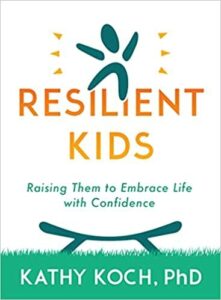
Receive the book Resilient Kids plus an audio download of the broadcast "Helping Your Child Develop Resilience" for your donation of any amount! Plus, receive member-exclusive benefits when you make a recurring gift today. Your monthly support helps families thrive.
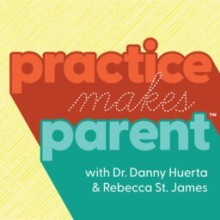
Join hosts Danny Huerta and Rebecca St. James as they bring you weekly episodes packed with the wisdom of parenting experts. Uncover Biblical truths, effective parenting techniques, and a treasure trove of resources designed to empower moms and dads in today's ever-evolving culture.
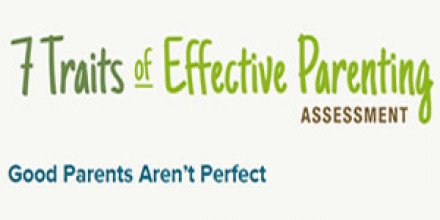
There's no parenting formula to follow, but there are ways you can grow every day. This assessment gives parents an honest look at their unique strengths, plus some areas that could use a little help.

Visit our online store and purchase a CD of today's program for yourself or to share with a friend.
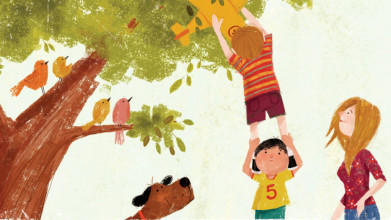
How to teach kids to bounce back after they face adversity or hardship.
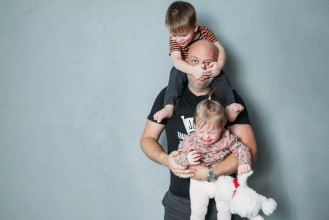
Most parents long to see their kids grow into resilient individuals who can face life’s challenges with confidence, compassion, and a deep-rooted faith.

Emotional and relational intelligence is one of the most critical, yet often overlooked, areas of development in our children. These five characteristics can help your child succeed in developing their relational intelligence.

Drs. Les and Leslie Parrott explain how you can improve your marriage by becoming emotionally healthy, and examine three key aspects of good emotional health.

Parenting can be intense, especially raising young children. Moms, especially, have a desperate need for God’s help every single day. Sarah Holmstrom and Stephanie Thurling want to encourage families to make prayer time a regular part of their routine, and they suggest fun games and traditions that can help get your kids more engaged with prayer.

Jean Marie Davis lived a horrific life as a sex trafficking victim for more than 20 years, where she was verbally and sexually abused, tortured, threatened by guns, and forced to live as a prostitute. She finally found freedom when she was invited to a pregnancy resource center (PRC) and introduced to Jesus Christ. Jean discovered her new identity in Christ, found practical help and a new life, and today is the executive director of a PRC in Vermont. (Part 2 of 2)

Larnelle Harris shares stories about how God redeemed the dysfunctional past of his parents, the many African-American teachers who sacrificed their time and energy to give young men like himself a better future, and how his faithfulness to godly principles gave him greater opportunities and career success than anything else.

Amy Carroll shares how her perfectionism led to her being discontent in her marriage for over a decade, how she learned to find value in who Christ is, not in what she does, and practical ways everyone can accept the messiness of marriage and of life.

Jonathan McKee offers parents practical advice and encouragement in a discussion based on his book If I Had a Parenting Do Over: 7 Vital Changes I’d Make.